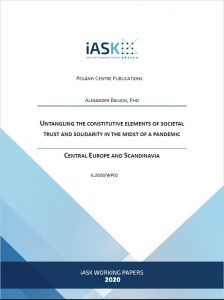Research & Studies
 About the Author
About the Author
Alexander Bielicki (USA/Norway 2020) has been a lecturer at the University of Oslo since 2013, and has been especially engaged with the university’s International Summer School. He is Program Director of the Higher Education Consortium for Urban Affairs’ (USA) exchange program at the University of Oslo, which focuses on globalization, national identity and belonging in the context of the Scandinavian welfare states. He holds a PhD in Cultural History and the History of Religions from the University of Oslo and an MA in Nationalism Studies from Central European University. His previous research has focused on the construction of religious and national identities in Central Europe, especially Slovakia. Currently, he is mainly interested in issues concerning immigration, integration and national identity.
Abstract
What does it mean to have trust in one’s country? Trust in those who lead the government, trust in the way society is ordered and organized, and trust in the people of the country can all influence how individuals perceive the country in which they live. This study examines the different facets of societal trust (the complex network of state, political, national and social trust) in four European countries – Norway, Sweden, Slovakia and the Czech Republic – and connects these with how people understand their society to be organized. Perceptions of sameness/difference, equality/inequality and the nation are examined in relation to levels of trust. The results presented from these four countries offer a more nuanced picture of what it means to have trust in government and institutions and what it means to have trust in those who inhabit one’s country, especially in a time of crisis. The main data sources are identical surveys in four languages.
II.2020/WP01Download